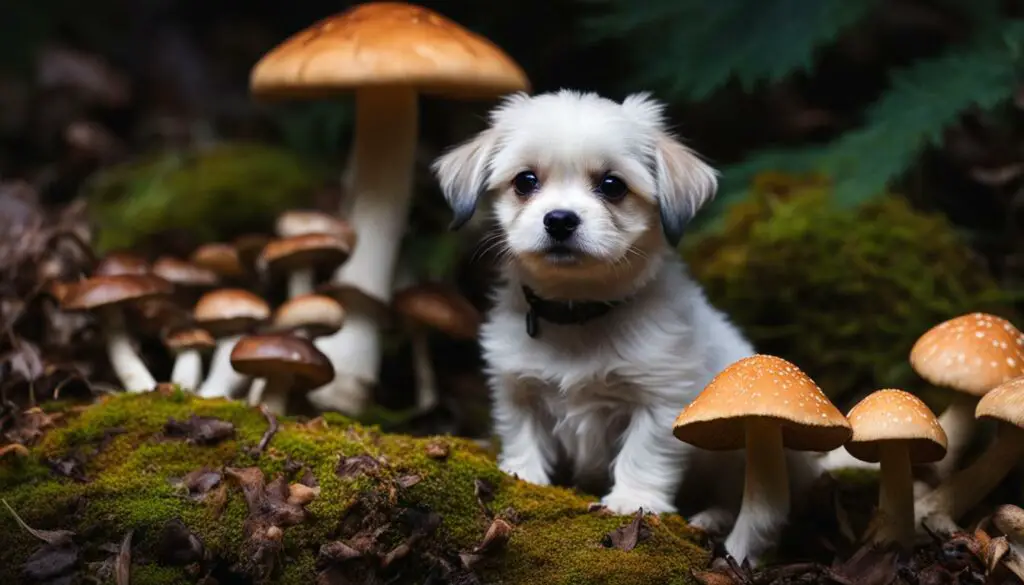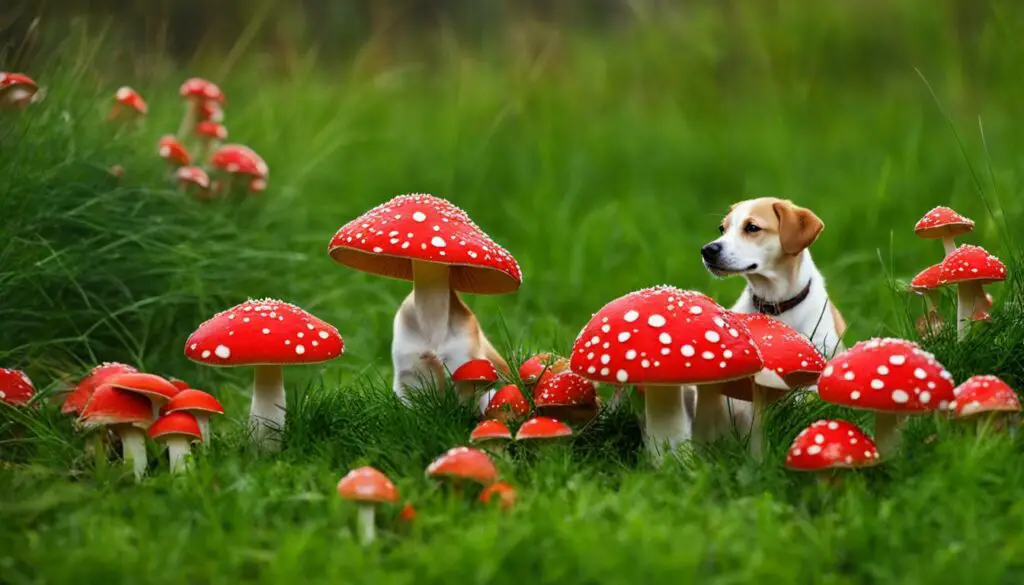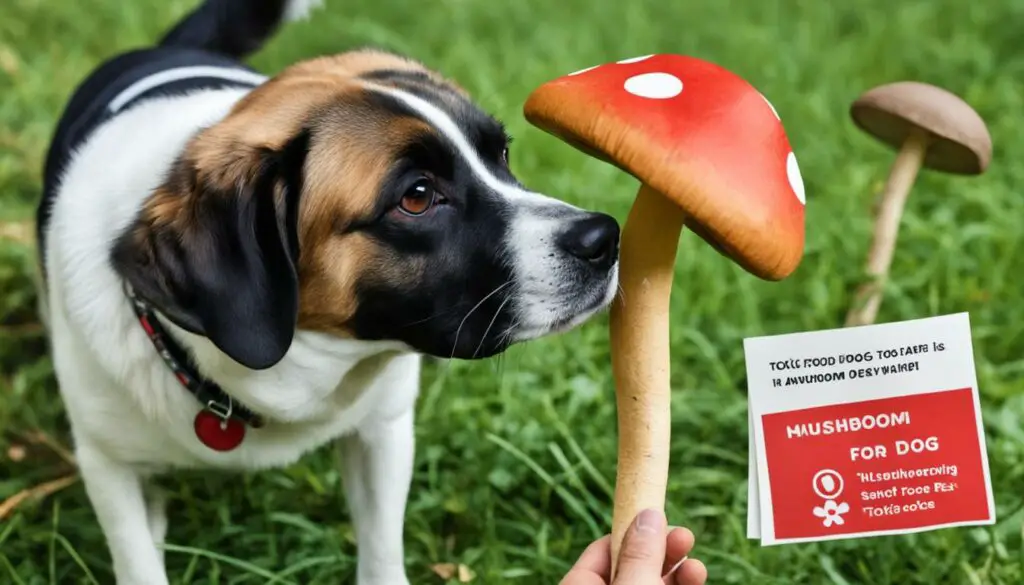Mushrooms can be a complicated food group for dogs. While some mushrooms are safe for dogs to eat, others can be toxic and pose serious health risks. It is important for dog owners to understand the potential dangers of dogs consuming mushrooms, especially those bought from the grocery store.
When it comes to feeding mushrooms to dogs, it is crucial to be cautious and well-informed. So, can dogs eat mushrooms from the grocery store? Let’s explore the topic further to ensure the well-being of our furry friends.
Table of Contents
Key Takeaways:
- Not all mushrooms are safe for dogs, including those from the grocery store.
- Wild mushrooms should be strictly avoided due to the high risk of toxicity.
- Some of the most toxic mushrooms for dogs are Amanita phalloides (death cap), Galerina marginata (deadly Galerina), and Amanita muscaria (fly agaric).
- Symptoms of mushroom poisoning in dogs can range from gastrointestinal upset to neurological issues.
- If you suspect your dog has ingested mushrooms and exhibits symptoms, seek immediate veterinary care.
Can Dogs Eat Wild Mushrooms?

Dogs should not be allowed to eat wild mushrooms as they can be highly toxic and cause severe poisoning. Even expert mushroom foragers can struggle to distinguish toxic mushrooms from non-toxic ones. It is crucial to respond quickly if a dog ingests a wild mushroom and seek veterinary assistance immediately.
Wild mushrooms pose significant risks to dogs if consumed. Unlike mushrooms from the grocery store, which are usually safe for dogs, wild mushrooms can contain harmful toxins that can lead to mushroom poisoning in dogs.
The risks of dogs eating wild mushrooms are twofold. First, many wild mushrooms are highly toxic and can cause a range of symptoms from gastrointestinal upset to organ failure. Second, even experienced foragers can struggle to identify toxic mushrooms, as they can closely resemble non-toxic varieties.
It is essential for dog owners to be aware of the dangers and take preventive measures to keep their dogs away from wild mushrooms. This includes being vigilant during walks or hikes, especially in wooded areas where mushrooms are commonly found.
“The foraging community recommends leaving wild mushrooms for the experts and keeping dogs away from them entirely.”
If you suspect that your dog has ingested a wild mushroom, do not wait for symptoms to appear. Seek immediate veterinary assistance, even if your dog appears to be fine. Prompt action can make a significant difference in treating mushroom poisoning and preventing serious complications.
Remember, prevention is key when it comes to dogs and wild mushrooms. Keep a close eye on your dog during outdoor activities and ensure they are not able to access or ingest any mushrooms they may encounter.
What Kinds of Wild Mushrooms Are Toxic to Dogs?

When it comes to wild mushrooms, dog owners should exercise caution as there are several types that are known to be toxic to dogs. It is essential to be aware of these poisonous varieties to prevent any accidental ingestion by our canine companions. Some of the most dangerous mushrooms that can cause serious harm to dogs include:
- Amanita phalloides (death cap)
- Galerina marginata (deadly Galerina)
- Amanita gemmata (jeweled deathcap)
- Amanita muscaria (fly agaric)
- Gyromitra spp. (false morel)
- Inocybe spp. and Clitocybe dealbata mushrooms
If a dog ingests any of these toxic wild mushrooms, it is crucial to seek immediate veterinary care. It is recommended to treat all wild mushrooms as potentially toxic, even if they are not on this list. Dogs have a curious nature, and it can be challenging to identify the exact species of a wild mushroom. Therefore, it is best to err on the side of caution and prevent dogs from ingesting any mushrooms found outdoors.
Symptoms of Mushroom Poisoning in Dogs

The symptoms of mushroom poisoning in dogs can vary depending on the species of mushroom consumed. It’s crucial for dog owners to be aware of these symptoms and seek immediate veterinary care if any signs of mushroom poisoning are observed.
Common symptoms of mushroom poisoning in dogs include:
- Gastrointestinal upset
- Sedation
- Tremors
- Seizures
- Salivation
- Watery eyes
- Increased urination
- Diarrhea
- Neurological symptoms
These symptoms can manifest shortly after ingestion or may appear several hours later. It’s important to note that not all symptoms may be present in every case of mushroom poisoning, and the severity of symptoms can vary. The ultimate priority is to seek immediate veterinary attention if you suspect your dog has consumed toxic mushrooms.
Remember, mushroom toxicity can lead to life-threatening complications, so time is of the essence in getting your dog prompt medical care.
| Mushroom Species | Common Symptoms |
|---|---|
| Amanita phalloides (death cap) | Gastrointestinal upset, liver and kidney damage, tremors, seizures, coma, and death |
| Galerina marginata (deadly Galerina) | Severe gastrointestinal distress, liver and kidney damage, tremors, seizures, coma, and death |
| Amanita gemmata (jeweled deathcap) | Nausea, vomiting, abdominal pain, hallucinations, delirium, liver and kidney damage, and death |
| Amanita muscaria (fly agaric) | Gastrointestinal upset, delirium, hallucinations, disorientation, and seizures |
| Gyromitra spp. (false morel) | Nausea, vomiting, headache, dizziness, and in severe cases, seizures and liver damage |
| Inocybe spp. and Clitocybe dealbata mushrooms | Gastrointestinal upset, mushroom poisoning syndrome characterized by excessive salivation, tearing, gastrointestinal distress, and tremors |
It is always recommended to seek immediate veterinary care if your dog ingests any type of mushroom, regardless of the symptoms displayed. It is better to err on the side of caution and let professionals assess the situation.
Treating Mushroom Poisoning in Dogs

If you suspect that your dog has ingested a toxic mushroom, it is crucial to seek veterinary care immediately. The treatment for mushroom poisoning in dogs will depend on several factors, including the type of mushroom ingested, the symptoms presented, and how recently the mushroom was consumed.
- Induced Vomiting: In some cases, the veterinarian may induce vomiting to remove any remaining mushrooms from the dog’s stomach.
- Administration of Medication: To counteract the toxins in the mushrooms, the veterinarian may administer medications such as activated charcoal or gastrointestinal protectants.
- Supportive Care: Dogs suffering from mushroom poisoning may require supportive care such as intravenous fluids to maintain hydration, anti-nausea medication, and monitoring of vital signs.
- Monitoring for Complications: Depending on the severity of the poisoning, the veterinarian may need to monitor the dog for potential complications such as liver failure or kidney injury, which can occur in some cases of mushroom toxicity.
Remember, do not attempt to treat mushroom poisoning in dogs at home without proper veterinary guidance. Prompt professional intervention is essential to ensure the best outcome for your pet.
| Type of Treatment | Description |
|---|---|
| Induced Vomiting | In some cases, the veterinarian may induce vomiting to remove any remaining mushrooms from the dog’s stomach. |
| Administration of Medication | To counteract the toxins in the mushrooms, the veterinarian may administer medications such as activated charcoal or gastrointestinal protectants. |
| Supportive Care | Dogs suffering from mushroom poisoning may require supportive care such as intravenous fluids to maintain hydration, anti-nausea medication, and monitoring of vital signs. |
| Monitoring for Complications | Depending on the severity of the poisoning, the veterinarian may need to monitor the dog for potential complications such as liver failure or kidney injury, which can occur in some cases of mushroom toxicity. |
It is always better to prevent mushroom poisoning in dogs by ensuring they do not have access to mushrooms, especially those found in the wild. However, accidents can happen, and being knowledgeable about the appropriate treatment options can make a significant difference in your dog’s recovery.
Can Dogs Eat Store-Bought Mushrooms?

Store-bought mushrooms, such as portobello mushrooms, are generally safe for dogs to eat. While it’s okay for dogs to enjoy these mushrooms, it’s important to keep a few things in mind to ensure their safety.
Avoid seasoned, cooked, or prepared mushrooms: Dogs should not consume mushrooms that have been seasoned, cooked in oils or butter, or prepared with ingredients like garlic or onions. These additives can be harmful to dogs and may cause digestive issues or other health problems.
Opt for dog-friendly alternatives: Instead of feeding dishes with mushrooms to dogs, consider dog-friendly alternatives as treats. There are plenty of fruits and vegetables that dogs can enjoy, such as blueberries, carrots, and green beans. These options provide nutritional benefits and are a safer choice for your furry friend.
Remember, while store-bought mushrooms are generally safe for dogs, each dog’s tolerance and sensitivity can vary. It’s always a good idea to consult with your veterinarian before introducing new foods into your dog’s diet to ensure they are suitable and won’t cause any adverse reactions.
In summary, store-bought mushrooms, like portobellos, can be included in a dog’s diet, as long as they are plain, fresh, and free from harmful additives. However, it’s generally safer to opt for dog-friendly alternatives to mushrooms and consult with a veterinarian for personalized advice on what’s best for your canine companion.
Are Mushrooms Bad for Dogs?

While mushrooms bought from the store are not toxic to dogs, they do not offer significant nutritional benefits either. There are other fruits and vegetables that provide more nutritional value to dogs, such as blueberries, broccoli, and green beans. Feeding dogs mushrooms should be done in moderation, and the majority of their diet should come from balanced dog food.
When it comes to the nutritional value of mushrooms for dogs, they are relatively low in calories and fat. However, they also contain a minimal amount of essential nutrients for dogs. Mushrooms are composed mainly of water and have a low protein content, making them less valuable as a source of nutrition compared to other dog-friendly foods.
While mushrooms may not be harmful to dogs when consumed in small quantities, it is important to note that some dogs may have specific food sensitivities or allergies. Therefore, it is essential to introduce any new food, including mushrooms, gradually into a dog’s diet and monitor for any adverse reactions.
The Nutritional Content of Mushrooms:
Below is a table showcasing the nutritional content of common edible mushrooms:
| Mushroom Variety | Calories | Protein (g) | Fat (g) | Carbohydrates (g) | Fiber (g) |
|---|---|---|---|---|---|
| White Button Mushrooms (1 cup) | 22 | 3 | 0.4 | 3.8 | 1 |
| Cremini Mushrooms (1 cup) | 18 | 2.2 | 0.2 | 3.1 | 1 |
| Portabella Mushrooms (1 cup) | 35 | 2.7 | 1 | 6.7 | 2.7 |
Note: Nutritional values may vary slightly depending on the specific mushroom variety and cooking method.
As seen in the table, while mushrooms provide some protein and fiber, they are relatively low in calories and fat. However, dogs require a more extensive range of nutrients for optimal health, including essential vitamins, minerals, and amino acids. Therefore, it is recommended to incorporate other dog-friendly foods that offer a more balanced nutritional profile into their diets.
It is important to consult with a veterinarian before introducing any new food into a dog’s diet. They can provide personalized nutritional advice based on your dog’s specific needs and help create a well-balanced diet that promotes their overall health and well-being.
Mushrooms That Are Safe for Dogs
While some mushrooms can be toxic to dogs, there are several types that are safe for them to consume. If you want to treat your furry friend with mushrooms, it’s important to choose the right ones. Here are some store-bought mushrooms that are safe for dogs:
| Mushroom Type | Benefits |
|---|---|
| White Button Mushrooms | A good source of antioxidants and B vitamins |
| Cremini Mushrooms | Rich in minerals and immune-boosting properties |
| Portabella Mushrooms | Contains fiber and potassium for a healthy digestive system |
| Baby Bella Mushrooms | Provides a good source of protein and vitamins |
| Shiitake Mushrooms | Boosts the immune system and supports heart health |
| Porcini Mushrooms | Rich in antioxidants and can aid in digestion |
| Maitake Mushrooms | Supports immune function and contains anti-inflammatory properties |
Before giving these mushrooms to your dog, make sure to wash them thoroughly to remove any dirt or debris. It’s also important to serve them plain, without any added seasonings, oils, or butter. While these mushrooms are safe for dogs to consume, it’s still best to offer them in moderation as part of a balanced diet.
Conclusion
While some mushrooms can be safe for dogs to eat, it is generally best to avoid feeding them mushrooms, especially if they are obtained from the wild. Wild mushrooms can be highly toxic and pose serious health risks to dogs. Even expert foragers can struggle to distinguish between toxic and non-toxic mushrooms, so it’s not worth taking the risk.
If a dog ingests any type of mushroom, it is important to seek immediate veterinary care. Symptoms of mushroom poisoning in dogs can vary, but they may include gastrointestinal upset, sedation, tremors, seizures, and salivation. Prompt and proper treatment is crucial to ensure the best chances of recovery.
To prevent dogs from eating mushrooms, it is important to be vigilant and keep an eye on them during outdoor activities. Clearing your yard of any wild mushrooms and removing them from areas where your dog has access can also help minimize the risk. When it comes to feeding mushrooms to dogs, it is best to consult with a veterinarian to ensure their safety and well-being.
FAQ
Can dogs eat grocery store mushrooms?
Yes, dogs can eat certain mushrooms bought from the grocery store, such as white button mushrooms, cremini mushrooms, portabella mushrooms, baby bella mushrooms, shiitake mushrooms, porcini mushrooms, and maitake mushrooms. However, it is important to wash them thoroughly and serve them plain without any added seasonings, oils, or butter.
Can dogs eat wild mushrooms?
No, dogs should not eat wild mushrooms. Wild mushrooms can be highly toxic and pose serious health risks to dogs. It is advised to treat all wild mushrooms as potentially toxic and seek immediate veterinary care if a dog ingests them.
What kinds of wild mushrooms are toxic to dogs?
Some of the most dangerous wild mushrooms that are toxic to dogs include Amanita phalloides (death cap), Galerina marginata (deadly Galerina), Amanita gemmata (jeweled deathcap), Amanita muscaria (fly agaric), Gyromitra spp. (false morel), and Inocybe spp. and Clitocybe dealbata mushrooms. It is best to avoid all wild mushrooms to keep your dog safe.
What are the symptoms of mushroom poisoning in dogs?
The symptoms of mushroom poisoning in dogs can vary depending on the species of mushroom consumed. Some common symptoms include gastrointestinal upset, sedation, tremors, seizures, salivation, watery eyes, increased urination, diarrhea, and neurological symptoms. If you suspect your dog has ingested toxic mushrooms, seek veterinary care immediately.
How is mushroom poisoning in dogs treated?
The treatment for mushroom poisoning in dogs will depend on the type of mushroom ingested, the symptoms presented, and how recently the mushroom was consumed. Veterinary treatment options may include induced vomiting, administration of medication to counteract toxins, supportive care to manage symptoms, and monitoring for complications like liver failure or kidney injury.
Can dogs eat store-bought mushrooms?
Yes, store-bought mushrooms, such as portobello mushrooms, are generally safe for dogs to eat. However, it is important to avoid serving mushrooms that have been seasoned, cooked in oils or butter, or prepared with ingredients like garlic or onions, which can be harmful to dogs.
Are mushrooms bad for dogs?
Mushrooms bought from the store are not toxic to dogs, but they do not offer significant nutritional benefits either. While some mushrooms are safe for dogs to eat, it is generally best to avoid feeding them mushrooms, especially if they are obtained from the wild. The majority of a dog’s diet should come from balanced dog food.
What mushrooms are safe for dogs?
Some store-bought mushrooms that are safe for dogs to consume include white button mushrooms, cremini mushrooms, portabella mushrooms, baby bella mushrooms, shiitake mushrooms, porcini mushrooms, and maitake mushrooms. Remember to wash them thoroughly before feeding them to your dog and serve them plain without any added seasonings or ingredients that could be harmful.
Can dogs eat mushrooms from the grocery store in moderation?
Yes, dogs can eat mushrooms from the grocery store in moderation. However, it is important to remember that mushrooms should not be a significant part of a dog’s diet, and the majority of their nutrition should come from balanced dog food. As always, it is recommended to consult with a veterinarian before introducing new foods into your dog’s diet to ensure their safety and well-being.
Source Links
- https://www.petmd.com/dog/nutrition/can-dogs-eat-mushrooms
- https://www.akc.org/expert-advice/nutrition/can-dogs-eat-mushrooms/
- https://www.purina.co.uk/articles/dogs/feeding/what-dogs-eat/can-dogs-eat-mushrooms
See also:

Leave a Reply